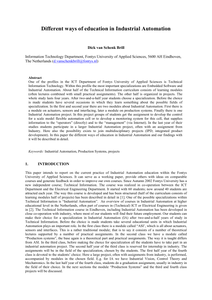Within the profile Technical Information Technology (ICT Department) the most important specializations are Embedded Software and Industrial Automation. About half of the Technical Information curriculum consists of learning modules, the other half is organized in projects. The whole study lasts four years. After two-and-a-half year students choose a specialization. Before the choice is made students have several occasions in which they learn something about the possible fields of specialization. In the first and second year there are two modules about Industrial Automation. First there is a module on actuators, sensors and interfacing, later a module on production systems. Finally there is an Industrial Automation project. In this project groups of students get the assignment to develop the control for a scale model flexible automation cell or to develop a monitoring system for this cell. In the last year of their studies students participate in a larger Industrial Automation project, often with an assignment from Industry. Here also the possibility exists to join multidisciplinary projects (IPD; integrated product development).
DOCUMENT

Background: The concept of Functional Independence (FI), defined as ‘functioning physically safe and independent from other persons, within one’s context”, plays an important role in maintaining the functional ability to enable well-being in older age. FI is a dynamic and complex concept covering four clinical outcomes: physical capacity, empowerment, coping flexibility, and health literacy. As the level of FI differs widely between older adults, healthcare professionals must gain insight into how to best support older people in maintaining their level of FI in a personalized manner. Insight into subgroups of FI could be a first step in providing personalized support This study aims to identify clinically relevant, distinct subgroups of FI in Dutch community-dwelling older people and subsequently describe them according to individual characteristics. Results: One hundred fifty-three community-dwelling older persons were included for participation. Cluster analysis identified four distinctive clusters: (1) Performers – Well-informed; this subgroup is physically strong, well-informed and educated, independent, non-falling, with limited reflective coping style. (2) Performers – Achievers: physically strong people with a limited coping style and health literacy level. (3) The reliant- Good Coper representing physically somewhat limited people with sufficient coping styles who receive professional help. (4) The reliant – Receivers: physically limited people with insufficient coping styles who receive professional help. These subgroups showed significant differences in demographic characteristics and clinical FI outcomes. Conclusions: Community-dwelling older persons can be allocated to four distinct and clinically relevant subgroups based on their level of FI. This subgrouping provides insight into the complex holistic concept of FI by pointing out for each subgroup which FI domain is affected. This way, it helps to better target interventions to prevent the decline of FI in the community-dwelling older population.
DOCUMENT

Symbiotic Urban Agriculture Networks (SUANs) are a specific class of symbiotic networks that intend to close material and energy loops from cities and urban agriculture. Private and public stakeholders in SUANs face difficulties in the implementation of technological and organisational design interventions due to the complex nature of the agricultural and urban environment. Current research on the dynamics of symbiotic networks, especially Industrial Symbiosis (IS), is based on historical data from practice, and provides only partly for an understanding of symbiotic networks as a sociotechnical complex adaptive system. By adding theory and methodology from Design Science, participatory methods, and by using agent-based modelling as a tool, prescriptive knowledge is developed in the form of grounded and tested design rules for SUANs. In this paper, we propose a conceptual Design Science method with the aim to develop an empirically validated participatory agent-based modelling strategy that guides sociotechnical design interventions in SUANs. In addition, we present a research agenda for further strategy, design intervention, and model development through case studies regarding SUANs. The research agenda complements the existing analytical work by adding a necessary Design Science approach, which contributes to bridging the gap between IS dynamics theory and practical complex design issues.
DOCUMENT

Tijdens het overbruggingsjaar zal het reeds bestaande liaison team vanuit Hogeschool Rotterdam (HR) en Scheepvaart en Transportcollege (STC) taken van fase 1 verder uitwerken, zoals beschreven in het Plan van Aanpak. Er is voor een team gekozen vanwege het complexe netwerk in het ecosysteem van Regio West. De leden hebben een overlappend netwerk op het vlak van energietransitie, onderwijs en in het maatschappelijk middenveld. Het huidige liaisonteam gaat daarbij het overbruggingsjaar gebruiken om een nieuw team voor te stellen dat aan de slag kan met Tranche 2 (indienen in september). De beoogde leden van dit nieuwe team zal een vertegenwoordiging vormen van de regioclusters (The Green Village, RDM Campus, Merwe4Havens, Duurzaamheidsfabriek). The Green Village zal zelf een vertegenwoordiger benoemen, namens de RDM Campus zal dit de liaison zijn namens Centre of Expertise HRTech van Hogeschool Rotterdam, Merwe4Havens is tevens de locatie van het Fieldlab Industrial Electrification, voor de Duurzaamheidsfabriek zal worden samengewerkt met H2makers.